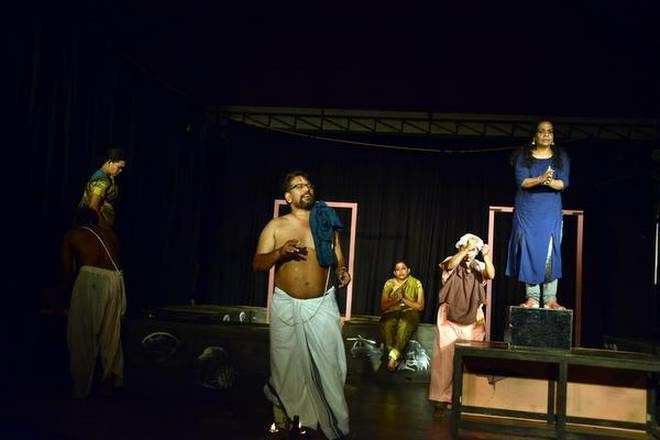The curtains lift to a clinical laboratory. Jessy, a nurse at the laboratory, is struggling between her faith and profession. Her religious beliefs are challenged when a young, mentally-challenged rape victim comes in for an abortion. She is puzzled when, Kavitha, a history professor, insists there is a lump on her shoulder when medical scans clearly prove there isn’t one. The nurse is also confused as to why Sahira, a Bengali woman, hasn’t gone into labor despite having crossed her due date months ago. An unnamed cleaning staff is on a cleaning spree at the laboratory. She suffers from a disorder; she sees dirt spots everywhere.
The play, says E. Rajarajeswari, who has scripted the as-yet-untitled tale, is on these women from different backgrounds and occupations, whose religions, castes, and social situations add to their list of problems.
“Turn on the news or pick up the newspaper and you will come across an incident of violence against women. I thought to myself, how do I create a play that will a hold a mirror to these violent times? How do I create a story that will depict women and their struggle to keep their lives and sanity in this day and age?” says Rajarajeswari, a founder member of Nireeksha Women’s Theatre.
Nireeksha was founded in 1998 by Rajarajeshwari and Sudhi Devayani as a platform for protest and to break the bonds placed on women by society through their works. If Pravaachaka, a retelling of the Greek myth of Cassandra, delves into the power structure in society and how women still find it difficult to be heard, Punarjani explores the gender disparity in our society, while Aanungal Illatha Pennungal is about five women and their complex relationships with reality, sexuality, and with each other.
“We create and perform plays that are mainstream; stories that deal with the everyday concerns of women, from a woman’s point of view.”
A scene from Nireeksha Women’s Theatre’s untitled play. | Photo Credit: Special arrangement
As for the new untitled play, Rajarajeshwari points out how, as women, we are all affected by the social violence around us as well as the hidden violence during our interaction with society. Violence, according to Rajarajeswari, is all around us and is subjective.
“We cannot measure violence; it is very subtle, like road rage, for example. In the play, Jessy is torn between the ideological differences of her faith and her job, while Kavitha, a Dalit, who has lost her family property in the name of development, suffers violence from ‘market-oriented progress.’ The cleaning woman is burdened by her desire to clean the ‘stains’ she sees all around her and which the society endlessly produces.”
A mannequin, which appears at intervals during the play, is an expressionist way of depicting saleswomen at high-end malls. These saleswomen are like live mannequins as they dress to impress and model the clothes for clients.
At some stage, they become mannequins, all from the same mold, dolled up and alike. One can’t help but wonder if Rajarajeshwari is trying to liken the mannequin to a Stepford Wife. Sahira, in a conversation with the women, mentions how her unborn child converses with her. Her child, she says, fears to enter an uncertain world.
When the women, who find themselves trapped in the laboratory hear that Sahira’s eldest daughter is raped and murdered, they try to free themselves through a gap in the monstrous door that is blocking their exit. As they struggle to escape the tight confines, symbolic to society and its stronghold on women perhaps, they emerge reborn, like a phoenix, ready to take the world face on.
Malu R.S. plays Jessy, while Kanchan plays Sahira. Subtitles of conversations Sahira has with her family in Bengali is scrolled on a television during the scenes.
Kanchan also dons the role of the mannequin as Shajeela plays the nameless cleaning staff. The direction of the play is by Sudhi, who dons the role of Kavitha. Shibu S. Kottaram, Biresh Krishnan, Arjun S. Suresh, and Preetha V.S. have supporting roles.
The 90-minute play, which was previewed at Nireeksha’s center at Pappanamcode recently, will be staged for the public in August.
This post originally appeared on The Hindu on July 4, 2018 and has been reposted with permission.
This post was written by the author in their personal capacity.The opinions expressed in this article are the author’s own and do not reflect the view of The Theatre Times, their staff or collaborators.
This post was written by Liza George.
The views expressed here belong to the author and do not necessarily reflect our views and opinions.


















